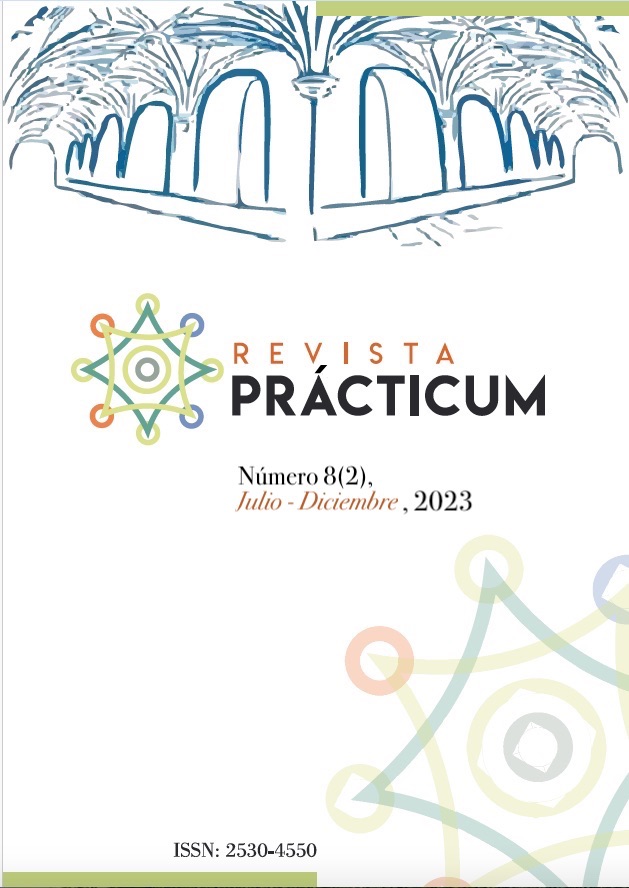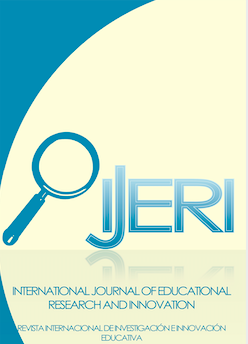Perception of orientation in the secondary school master's practicum
DOI:
https://doi.org/10.24310/rep.8.2.2023.17744Keywords:
Department of Guidance, Sustainable Development Goals, Master's Degree in Teaching, secondary education, inclusive educationAbstract
Guidance departments carry out fundamental work in secondary schools for educational improvement, coordination between different agents in the educational community and outside it. In this research, the perceptions of the practicum students of the secondary master's degree in the specialty of Physics and Chemistry on the role they acquire in secondary schools were analyzed. The aim was also to make known and value the contribution of these professionals, as well as their contribution to the achievement of the Sustainable Development Goals (SDG). The results show that the students, during their internship period, have noticed, to a greater extent, the functions related to attention to diversity, both academic and professional guidance, and support for the personal development of students, as well as their contribution, above all, to SDGs 3 and 4.
Downloads
Metrics
Publication Facts
Reviewer profiles N/A
Author statements
Indexed in
-
—
- Academic society
- N/A
- Publisher
- Universidad de Málaga
References
Ainscow, M., Dyson, A., Goldrick, S. y West, M. (2013). Promoviendo la equidad en educación. Revista de Investigación en Educación, 11(3), 44-56.
Alcaraz, R. S., Monllor, E. M. T., & Rubio, J. G. (2022). Los Objetivos de Desarrollo Sostenible en el currículo escolar según la experiencia del alumnado en el prácticum II de Magisterio. Didáctica de las Ciencias Experimentales y Sociales, 43, 91-106. https://doi.org/10.7203/DCES.43.25305
Arnaiz, P., De Haro, R. & Azorín, C. M. (2018). Redes de apoyo y colaboración para la mejora de la educación inclusiva. Profesorado. Revista de Currículum y Formación de Profesorado, 22(2), 29-49. https://doi.org/10.30827/profesorado.v22i2.7713
Azorín-Abellán, C.M. (2018). Abriendo fronteras para la inclusión: la ecología de la equidad. Revista de Educación Inclusiva, 11(1), 213-228.
Cayuela, L., Cerame, Á., Ortega-Calvo, M., & Cayuela, A. (2023). Incidence and Prevalence of Suicide Attempts in Primary. Care in Spain. International Journal of Mental Health and Addiction, 1557-1882. https://doi.org/10.1007/s11469-023-01165-0
Chocomeli, M. F., Monzó, A., & Martínez-Agut, M. P. (2023). La orientación profesional como un derecho clave para la inclusión social. Livro de Atas: XXXIV Congresso Internacional da SIPS (Sociedade Iberoamericana de Pedagogia Social) e 10.ª Conferência Internacional de Mediação Intercultural e Intervenção Social - ''Pedagogia Social e Mediação Intercultural: Teoria e Prática na Intervenção Socioeducativa''. Leiria: CICS. NOVA. IPLeiria y ESECS. Instituto Politécnico de Leiria. (pp. 755-762). https://doi.org/10.25766/d6g0-b749
Conselleria de Educación, Cultura y Deporte. (2021). Decreto 72/2021, de 21 de mayo, del Consell, de organización de la orientación educativa y profesional en el sistema educativo valenciano. DOCV núm. 9099.
Conselleria de Educación, Cultura y Deporte, (2023). ORDEN 10/2023, de 22 de mayo, por la que se regulan y se concretan determinados aspectos de la organización y el funcionamiento de la orientación educativa y profesional en el sistema educativo valenciano Conselleria de Educación, Cultura y Deporte . Diario Oficial de la Generalitat. Núm. 9606 (2023)
Ferrandis, M. V., Grau, C., & Fortes, M. C. (2010). El profesorado y la atención a la diversidad en la ESO. Revista de Educación Inclusiva, 3(2), 11-28.
Ferrer, A. (2019). Identificando buenas políticas y prácticas para una educación inclusiva. Participación Educativa, 6(9), 165-174. https://sede.educacion.gob.es/publiventa/identificando-buenas-politicas-y-practicas-parauna-educacion-inclusiva/ensenanza-politica-educativa/23961.
Gabarda, V., & Colomo, E. (2019). Los tutores de prácticas en los centros: comparativa autonómica del Practicum del Máster de Educación Secundaria. Revista Española De Educación Comparada, (34), 163–181. https://doi.org/10.5944/reec.34.2019.23524
Hernández-Rivero, V. M., & Mederos-Santana, Y. (2018). Papel del orientador/a educativo como asesor/a: funciones y estrategias de apoyo. REOP. Revista española de Orientación y Psicopedagogía, 29(1), 40-57. https://doi.org/10.5944/reop.vol.29.num.1.2018
Hunsu, N. J., Oje, A. V., Tanner-Smith, E. E., & Adesope, O. (2023). Relationships between risk factors, protective factors and achievement outcomes in academic resilience research: A meta-analytic review. Educational Research Review, 41. https://doi.org/10.1016/j.edurev.2023.100548.
Jefatura del Estado. Ley Orgánica 3/2020, de 29 de diciembre, por la cual se modifica la Ley Orgánica 2/2006, de 3 de mayo, de Educación, Boletín Oficial del Estado nº 340 (2020).
Jefatura del Estado. Ley Orgánica 3/2022, de 31 de marzo, de ordenación e integración de la Formación Profesional, Boletín Oficial del Estado nº 78 (2022).
Messiou, K., Ainscow, M. (2015). Responding to learner diversity: Student views as a catalyst for powerful teacher development? Teaching and Teacher Education 51, 246-255. https://doi.org/10.1016/j.tate.2015.07.002.
López-Vélez, A. L. (2018). La escuela inclusiva: el derecho a la equidad y la excelencia educativa. Universidad del País Vasco / Euskal
Herriko Unibertsitatea, Argitalpen Zerbitzua = Servicio Editorial, [2018]. Recurso en línea: PDF (93 p.)
Llorent, V. J., Farrington, D. P., & Zych, I. (2021). La política de clima escolar y sus relaciones con las competencias sociales y emocionales, el acoso escolar y el ciberacoso en la educación secundaria. Revista de Psicodidáctica, 26, 1, 35-44. https://doi.org/10.1016/j.psicod.2020.11.002.
Martínez-Agut, M. P., Gallardo-Fernández, I. M., & Albert-Monrós, E. M. (2022). La orientación educativa y profesional como tarea colectiva y contextualizada: su organización en la Comunidad Valenciana. En L. Vega-Caro y A. Vico-Bosch (coord). Investigaciones teóricas y experiencias prácticas para la equidad en Educación (pp. 850-875). Dykinson, S. L.
Martínez-Agut, M. Pilar y Monzó-Martínez, Anna (2023). Compromiso con la Educación de los Docentes: Identidad y Ciudadanía Mundial desde los Objetivos de Desarrollo Sostenible (ODS). En C. Naval, J. L. Fuentes y L. D. Rojas, Desarrollo de la Identidad y el Buen Carácter en el Siglo XXI, (pp. 324-333), Editorial Dykinson Ebook.
Miranda, M., Lorenzo, J., Arias, J. M. & Peña, E. (2018). Percepción del profesorado de orientación educativa de la atención a la diversidad en centros de primaria y secundaria en Asturias (España). REOP. Revista española de Orientación y Psicopedagogía, 29(2), 71-86. https://doi.org/10.5944/reop.vol.29.num.2.2018
Miret, M., Caballero, F. F., Huerta-Ramírez, R., Moneta, M. V., Olaya, B., Chatterji, S. Haro, J. M., & Ayuso-Mateos, J. L. (2014). Factors associated with suicidal ideation and attempts in Spain for different age groups. Prevalence before and after the onset of the economic crisis. Journal of Affective Disorders, 163, 1-9, https://doi.org/10.1016/j.jad.2014.03.045.
Molina, A. (2016). Alumnos con altas capacidades: detección y respuesta educativa. Revista Internacional de apoyo a la inclusión, logopedia, sociedad y multiculturalidad, 2(1), 39-54.
Moliner, O. & Fabregat, P. (2021). Nuevos Roles y Estrategias de Asesoramiento Psicopedagógico para Promover la Educación Inclusiva en la Comunidad Valenciana. Revista Española de Orientación y Psicopedagogía, REOP, 32(1), 59 – 7.
Morales, R., Navarro, M. & Rondón, B. (2017). Perspectivas de la orientación educativa: retos e intervención en el área de las altas capacidades y desarrollo de talentos estudiantiles. Revista Ciencias de la Educación, 27(50), 58-72.
Rapanta, C., García-Milá, M., Remesal, A., & Gonçalves, C. (2021). El reto de la enseñanza dialógica inclusiva en la escuela pública secundaria. Revista científica de Comunicación y Educación. Comunicar, 66,21-31. https://doi.org/10.3916/C66-2021-02
Sarceda, M. C. ., Barreira-Cerqueiras, E. M., & Caldeiro-Pedreira, M. C. (2020). El Prácticum en la formación del profesorado técnico de FP. Revista Practicum, 5(1), 37–53. https://doi.org/10.24310/RevPracticumrep.v5i1.9829
Solís,P. & Real, S. (2023). Actitudes hacia la inclusión de estudiantes con discapacidad en profesorado de Secundaria. Profesorado, Revista de Currículum y Formación del Profesorado, 27,(2). 267-286. https://doi.org/10.30827/profesorado.v27i2.21321
Traver, S. & Sanahuja, A. (2022). Acompañamiento y orientación educativa: hacia procesos de asesoramiento orientados a generar prácticas más inclusivas. Revista de Educación Inclusiva, 15(2), 237-252. http://hdl.handle.net/10234/201863
Vélaz de Medrano, C., López, E., Expósito, E., & González, A. (2016). El enfoque intersectorial en la provisión de orientación y apoyo escolar. Perspectiva de orientadores, tutores y directores. Revista Complutense de Educación, 27, 3, 1271-1290. https://doi.org/10.5209/rev_RCED.2016.v27.n3.47707
Vélaz-de-Medrano Ureta, C., González-Benito, A., & Otero-Mayer, A. (2023). Análisis comparado del modelo y organización de los servicios de orientación profesional en el contexto europeo. REOP - Revista Española De Orientación Y Psicopedagogía, 34(2), 29–46. https://doi.org/10.5944/reop.vol.34.num.2.2023.38065
Wilson, C., Green, N., Toye, M. & Ballantyne, C, (2023). Teachers' perceptions and practices towards inclusive education for children with ADHD in Scotland: a qualitative inquiry. International Journal of Disability, Development and Education. https://doi.org/10.1080/1034912X.2023.2266374

Downloads
Published
How to Cite
Issue
Section
License
Copyright (c) 2023 Anna M. Monzó Martínez, M. Fernanda Chocomeli Fernandez, M. Pilar Martínez-Agut (Autor/a)

This work is licensed under a Creative Commons Attribution-NonCommercial-ShareAlike 4.0 International License.
Acceptance of the work implies that the author grants Revista Prácticum the exclusive rights to reproduce, distribute and sell his or her work worldwide, both in digital and paper formats, CD-ROM, etc.
Likewise, the authors shall grant Revista Prácticum the rights of dissemination, public communication on the Internet and IT networks, data buses, as well as any other portals or electronic devices for online consultation of its contents and extracts, under the conditions of the portal, repositories or databases where the work is stored.
Revista Prácticum allows authors to publish and disseminate their articles and works on their personal websites, research teams, institutional repositories and scientific databases. All this in accordance with the Creative Commons 4.0 License









8.png)








